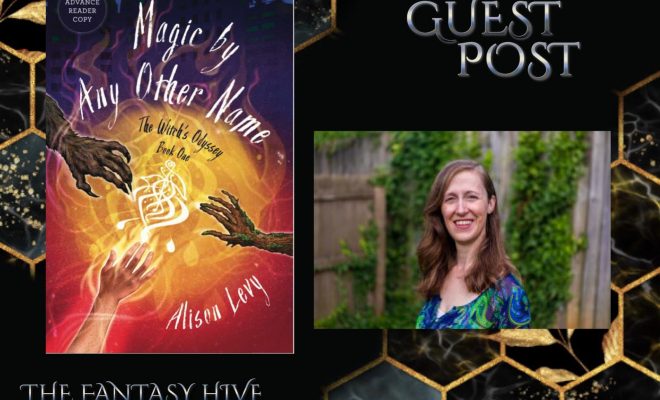Fantasy Truth – GUEST POST by Alison Levy (MAGIC BY ANY OTHER NAME)

Today, we’re welcoming Alison Levy back to the Hive to discuss realism in fantasy!
Before we hand you over to Alison, let’s find out a little about Alison’s upcoming novel, Magic By Any Other Name:
Ivy Nichols O’Reilly has grown up in a wealthy family full of magic, fantasy creatures, and emotional abuse—but when her narcissistic mother arranges an unwanted marriage for her, the young witch reaches her breaking point. She drops out of college, changes her name to Georgette, and flees across the country with her best friend, a Wood Nymph named Mei-Xing.
Georgette is determined to build a new identity and a new life. But her journey leads her to cross paths with a number of magical characters—a Werehyena searching for his kidnapped wife; a Vampire who runs a unique magical business; a curandero, a shamanistic practitioner of traditional medicine; and a Valkyrie who, along with her raven partner, wants to make a risky deal—who make it clear to her that the past is not so easily left behind. In order to grow into her new identity, help her new friends, and develop a healthy relationship with a man she’s beginning to care for, Georgette will have to confront the privileges that have shielded her from the pain and ugliness of the magic community in which she was raised—and find the strength to overcome the trauma of her childhood.
Magic By Any Other Name is due for release 7th November. You can pre-order your copy on Bookshop.org
Fantasy Truth
by Alison Levy
Why does fantasy teach us more about our humanity than realism? Fantasy is, by its very nature, a genre that employs elements that cannot exist in the real world. Since it depends on locations, events, and people that are magical or supernatural, one could be forgiven for assuming that fantasy isn’t a reliable means of discovering truth. But fantasy-lovers know better—where realism might offer us truth, fantasy invites us to experience it.
It’s to be expected that books of realistic fiction follow a human protagonist but it might surprise some people to learn that the same is typically true in fantasy as well. In my own book full of inhuman beings from myth and legend, I choose a witch, a human woman, as the main character. Authors do this intentionally because readers find it easier to identify and connect with protagonists who to some extent resemble themselves. Even those fantasy books written from the point of view of a non-human will give that character human attributes for the reader to latch on to. Is the hero imaginary? Yes, but that’s also true of the hero in a realism fiction book—after all, Jay Gatsby is just as made up as Harry Potter.
Fantasy also tends to spend more time describing the setting and give more details about the supporting cast. Why? Because in realistic fiction, where the story takes place in the world we already know, we don’t need the details to understand the story. My book is set primarily in California, a real-world setting that will be familiar to readers at least on a basic level, so I’ve directed the bulk of my descriptive focus to the otherworldly people and actions which will be new to readers. Where mundane, realistic settings and characters boxes in the story, fantasy weaves a new reality and makes sure we are fully immersed in it to engage with the mythical and the magical on a personal level.
In a fantasy tale, the problems the hero faces are so much greater than those we face in our everyday lives: travel across Mid-World, a wasteland perforated with interdimensional doorways, to reach the Dark Tower; battle the one ring’s wicked influence while you trek through Middle Earth toward Mordor; rise to power on Arrakis as your emerging prescience warns you of the coming devastating wars. At a glance, these stories seem too wildly removed from common experience to teach us anything, but through our engagement with the hero and his/her tribulations, we learn far more about ourselves than any realism story could teach us.
We aren’t literally slogging our way to the Dark Tower but joining Roland on his quest might help us see the double-edged nature of blind devotion to a cause. None of us has to contend with the one ring’s hideous impact on Frodo but we’ve all felt the pull of darkness and struggled to resist evil within ourselves. There is no Arrakis for us to rule but by following Paul’s rise to sovereignty, we learn a lot about the value of overcoming fear as well as the dangers of charismatic leadership. And while no real person flees from their magic family only to be caught up in the chaos of witches and werehyenas, I hope the fantastical elements of my book encourage those recovering from a toxic family to see that no matter how isolated you feel, you are stronger than you think and you are never truly alone.
The human truths we learn from fantasy, while not as straightforward as lessons learned from realism, are extraordinarily more adaptable to our personal experiences. Accompanying a fantasy hero on his/her journey teaches us how different types of people approach and solve epic problems. The adversity in our own lives becomes less daunting once we have walked in the footsteps of a fantasy protagonist and collected the truths that his/her story has left for us to gather.
Fantasy lays out the ultimate truth of humanity: though monsters are not real, we all face them, and because of fantasy, we know they can be beaten.
Alison Levy lives in Greensboro, North Carolina with her husband, son, and variety of pets. When she’s not writing or doing mom things, she crochets, gardens, and walks her collies.
